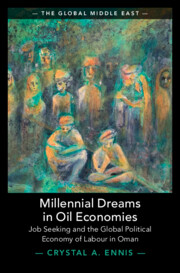Book contents
- Millennial Dreams in Oil Economies
- The Global Middle East
- Millennial Dreams in Oil Economies
- Copyright page
- Contents
- Figures
- Maps
- Tables
- Preface
- Acknowledgements
- A Note on Transliteration
- Abbreviations
- Maps
- 1 Bringing Citizen Labour into IPE Scholarship on the Gulf
- 2 Making Global Labour Markets and National Dreams
- 3 Rereading Omani Work History and Labour Market Governance
- 4 Promising Dubai in Sohar
- 5 Constructing Belonging and Contesting Economic Space
- 6 Pursuing Entrepreneurship for Employment
- Conclusion
- Bibliography
- Index
4 - Promising Dubai in Sohar
Radical Transformations and Job Creation from Sohar to Duqm
Published online by Cambridge University Press: 02 January 2025
- Millennial Dreams in Oil Economies
- The Global Middle East
- Millennial Dreams in Oil Economies
- Copyright page
- Contents
- Figures
- Maps
- Tables
- Preface
- Acknowledgements
- A Note on Transliteration
- Abbreviations
- Maps
- 1 Bringing Citizen Labour into IPE Scholarship on the Gulf
- 2 Making Global Labour Markets and National Dreams
- 3 Rereading Omani Work History and Labour Market Governance
- 4 Promising Dubai in Sohar
- 5 Constructing Belonging and Contesting Economic Space
- 6 Pursuing Entrepreneurship for Employment
- Conclusion
- Bibliography
- Index
Summary
Offering two case studies – the economic transformations of Sohar and Duqm – this chapter grounds the book’s argument about Oman’s global labour market in material cases of spatial transformation and the integration into global value chains through which both commodities and labour circulate. The chapter argues that millennial citizen expectations take shape in these developments, from the interaction of ostensible outcomes of economic globalisation, neoliberalism, and government responsibilities of governing hydrocarbon windfalls. Citizen reactions emerge from their perceived right to, or exclusion from, these returns. The chapter further substantiates two points through these cases. First, both neoliberal reform and oil wealth explicitly or implicitly make promises to populations about an improved economic life, which, when unrealised, results in disenfranchisement and discontent. Second, capital needs labour and pursues supplies from the global labour market not only because it is cost effective but deliberately because it is both flexible and controllable. It seeks to avert potential labour disruption and secure seamless operations. Together, these findings show the ways Omani labour organises and the power of labour through the threat of its resistance.
Keywords
- Type
- Chapter
- Information
- Millennial Dreams in Oil EconomiesJob Seeking and the Global Political Economy of Labour in Oman, pp. 146 - 202Publisher: Cambridge University PressPrint publication year: 2025

